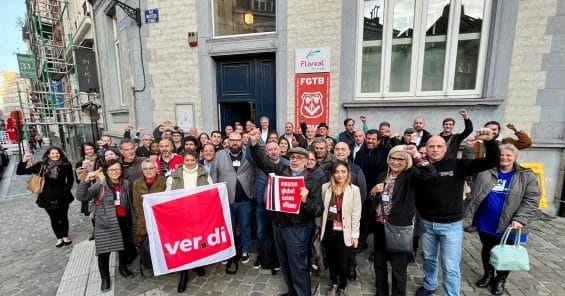UNI and FIR: Orpea scandal shows dire consequences of collective inaction on social issues
10.02.22
UNI Global Union and the Forum for Responsible Investment (FIR) have issued a joint statement calling on all stakeholders to act together to fix deep-seated problems in the long-term care sector. The recent scandal at Orpea, ignited by the book The Gravediggers, has exposed troubling, long-standing issues at the company and beyond—many of which exacerbated by the Covid-19 pandemic. Last March, FIR supported the UNI-led coalition of more than 100 investors who put forth new standards for long-term care providers. The organizations also organized an investor briefing on the subject in October.
Please read the statement below. In French, here.
Orpea scandal shows dire consequences of collective inaction on social issues
The recent allegations of mismanagement and cost-cutting at the expense of residents, workers and taxpayers at the French elder care company Orpea and the wider sector are deeply disturbing. However, the endemic issues in the sector that allowed for this to take place are not new to those closely observing long-term care.
COVID-19 exacerbated long-term care’s systemic problems including understaffing, precarious work, and underfunding but they existed long before—and not just at Orpea and not just in France.
The failures raised at Orpea and beyond requires more than a reshuffling in the C-Suite or a refreshing of the board of directors. It needs all stakeholders working in concert to transform the industry. An important step is recognizing that the long-term care sector is a high-risk sector for these material social risks related to the quality of care for residents and working conditions.
Recognizing the risks of the sector means that investors cannot turn a blind eye to the systemic problems in our long-term care systems, and the risks this poses for not just individual companies in the sector but also more widely with the importance to society to meet our needs for adequate eldercare. Within the privatized long-term care sector, which includes a growing share of for-profit companies, investors will have to play a part in the solutions. Critically, investors will need to ensure they truly walk the talk in supporting companies towards best practice and in their expectations in terms of social responsibility. The financial result should reward a particular social performance, not undermine it.
Stewardship has an essential and urgent role to play in the midst of this crisis. Last March to coincide with the one-year anniversary of the pandemic and its impact on the long-term care sector, a coalition that has grown to 105 investors with $3.45 trillion in assets under management, coordinated by UNI Global Union, launched a statement of expectations for the sector – including on ensuring safe staffing levels, health and safety, union rights and quality of care for residents. From this, these investors have come together to implement this commitment by engaging with companies across the sector on how to make these a reality. This latest scandal shows just how critical this is and that this engagement could not be more urgent, but will need to persist far beyond the immediate crisis.
A few months later, the French Sustainable Investment Forum (FIR) provided an opportunity for UNI Global Union to meet with its members so that they could learn about, form an opinion on and, if of interest participate in this coalition.
A clear strength of this initiative is that it is multi-stakeholder, bringing in the expertise of UNI Global as a global trade union federation, alongside the experience of participating investors in active stewardship. This unusual model of collaborative engagement allows for sharing in-depth experience of the social issues based on knowledge from the field directly, with affiliated trade unions representing 20 million workers across 150 different countries. This type of perspective is not often be unearthed in investment analysis from the usual sources of investors.
A multi-stakeholder model also allows for a more effectively coordinated response to the complex challenges at play. As many of the allegations of Victor Castanet’s Les Fossoyeurs show a part of what has allowed disfunctions in the sector to escalate to this scale is the fragmentation amongst those actors seeking to address each individual problem in silos, rather than working together.
The operators in the long-term care sector could do with emulating this model of collaboration with trade unions to put in place solutions that work for residents and workers. Union representation and collective bargaining are counterweights against the worst cuts affecting care quality, but levels are extremely low across the sector. Unions ensure better access to protective equipment, paid sick leave for exposed workers, and stronger infection prevention protocols. Long-term care centres with staff covered by collective bargaining tend to have more workers who are better trained with higher pay, resulting in better quality of care for residents.
A study during the early stages of the pandemic found that unionized care centres had a 30 per cent lower mortality compared to facilities without unions. In France, Germany, and elsewhere, Orpea has a history of resistance to unions. We believe this opposition risks eroding care quality, which could potentially put lives in danger, and create a higher-risk environment for investors. This risk can be mitigated through working with unions on a local, national and global level.
We know that transforming the long-term care industry—or even a single company like Orpea—cannot happen overnight. It will require all actors to step up to play their role – from regulators to operators, investors to trade unions and advocates for the elderly. But right now, during this crisis, there is an urgent window to come together to address the problems afflicting elder care.
This moment should act as a final wakeup call for investors that saw the importance of the “S” in ESG in the pandemic. The FIR and UNI Global Union call on investors to make social issues a real area of progress, to take better account of social dialogue, working conditions and employment, and to develop their positive impact on social issues.
The story of Orpea shows that this effort requires enhanced due diligence on companies in the care sector, dialogue with civil society and trade unions, and ambitious shareholder’s engagement to avoid dire consequences of collective inaction.
Alexis Masse, President of Forum pour l’Investissement Responsable
Christy Hoffman, General Secretary of UNI Global Union



